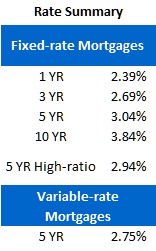David Larock in Mortgages and Finance, Home Buying, Toronto Real Estate News
 The devil is always in the detail.
The devil is always in the detail.
When Spain’s 100 billion euro bailout was finalized and the euro zone’s leaders wrapped up the latest European summit shortly thereafter, both Italian and Spanish bond yields dropped precipitously. The ensuing press conferences successfully triggered the market’s Pavlovian response to buy while the flash bulbs were going off, but the knee-jerk rally didn’t last long.
Crisis-hardened investors have learned to hold their enthusiasm until they see what’s behind the curtain. Once they started to focus on the details, discrepancies between the post-meeting sound bites and what was actually agreed upon started to emerge. 
Here is what I learned over the last week about those devilish details.
- We were told that future bank bailout funds would bypass government balance sheets and flow directly to imperiled banks so as not to increase sovereign-debt burdens. While that is technically true, governments will still have to guarantee all emergency loans that flow to their banks and as such, this change is just a sleight-of-hand accounting trick to make official debt and deficit numbers look better than they really are.
- Spanish Prime Minister Rajoy had originally said that Spain’s bailout would not come with any new austerity strings attached but the terms of the agreement indicated otherwise. It was not a coincidence that on Wednesday of last week the prime minister announced sixty-five billion euros in new spending cuts over the next two years (Spain’s harshest cuts to date) along with new tax increases.
- The timeline for creating a pan-European banking regulator is now late 2013, which will be far too late to help bring Spanish banks back from the brink on which they are now precariously balanced. Over the longer term, a banking union was seen as the first step towards pan-European deposit insurance and eventually, it was hoped, some form of debt mutualization (or euro bonds). But any hope that the latest European summit would start the region down this path now appears to have been wishful thinking. In the end, all we have is another plan to make a plan.
- The biggest head fake came from the post-European summit narrative claiming that austerity’s back had been broken. The story went that French President Hollande, Spanish Prime Minister Rajoy and Italian Prime Minister Monti had called German Chancellor Angela Merkel’s bluff and forced her to relent on her long-standing insistence that bailouts be tied to fiscal reforms. It is now clear that Chancellor Merkel remained as steadfast as ever and that any implication to the contrary was just political posturing.
For a crisis, the euro zone’s financial meltdown has been surprisingly predictable. If past is prologue, we have now entered the next build-up stage where Spanish and Italian bond yields will bounce upwards until the sound of trumpets announces the next round of emergency measures . Then comes the next knee-jerk rally that fades faster than a sugar high, and around and around we go. Wash, rinse, repeat until either the markets refuse to buy Spanish and Italian debt or the euro-zone countries agree to cede their fiscal sovereignty and to accept pan-European oversight of their budgets. For now the slow-motion train wreck continues.
Five-year Government of Canada (GoC) bond yields were down 3 basis points for the week, closing at 1.18% on Friday. Market five-year fixed-rate mortgages are still priced in the 3.09% range but at those levels lenders are enjoying higher-than-normal spreads. As such, borrowers who shop around can do better, particularly high-ratio borrowers who can find fully-featured five-year fixed-rate mortgages at less than 3%.
Variable-rate mortgages are offered at only small discounts off prime (prime minus .20%, or 2.8%) and I think that leaves them too close to fixed rates to justify their inherent risk.
The bottom line: The euro-zone crisis remains the dominant force that is governing market sentiment and ongoing fears of a euro-zone collapse should continue to drive demand for the relative safety of our GoC bonds. If that trend holds, our bond yields and, by association, our mortgage rates, will remain at ultra-low levels until the euro zone looks a lot different from today.
David Larock is an independent mortgage planner and industry insider specializing in helping clients purchase, refinance or renew their mortgages. David's posts appear weekly on this blog (movesmartly.com) and on his own blog integratedmortgageplanners.com/blog). Email Dave



